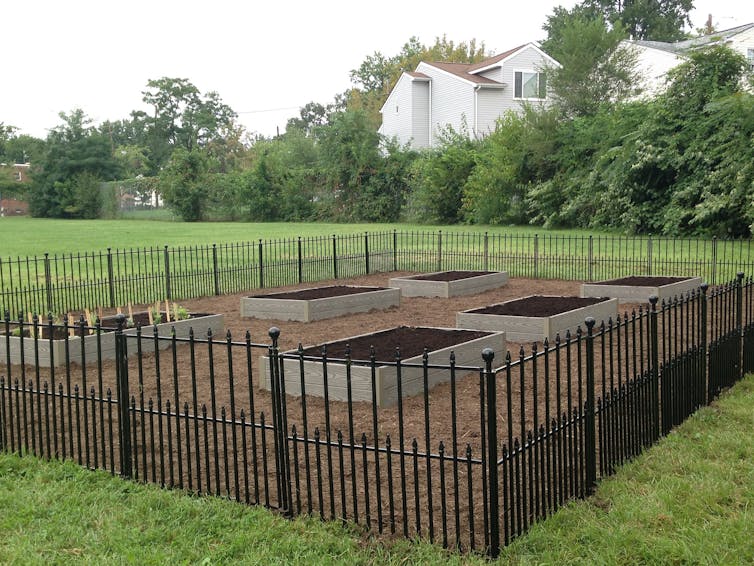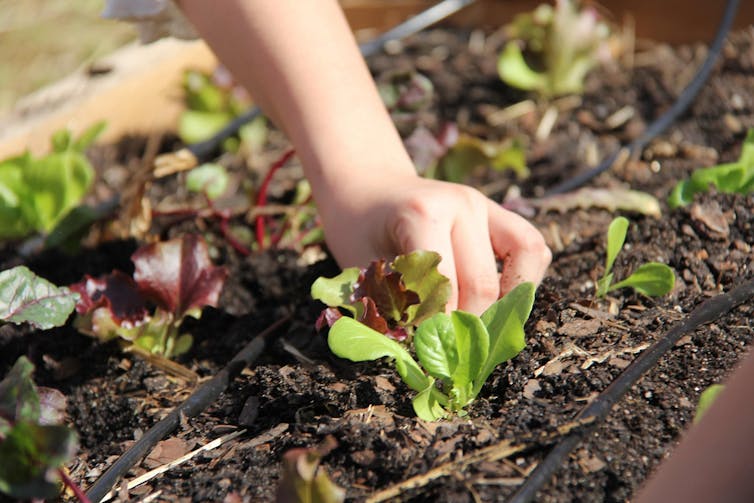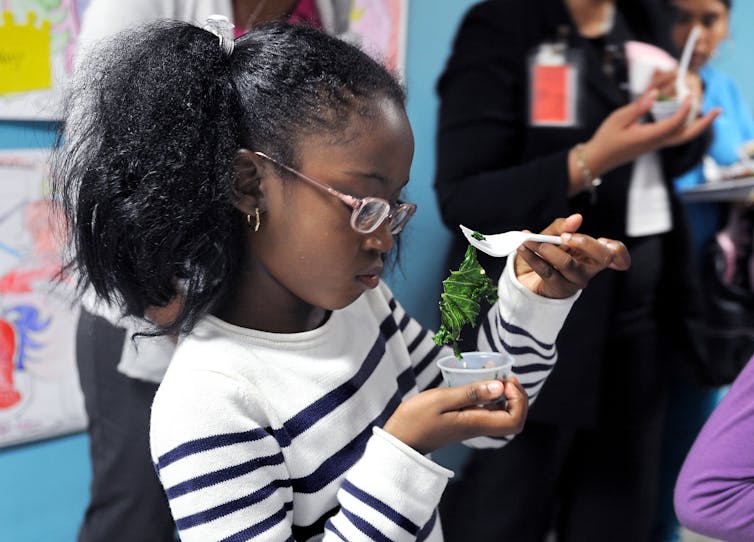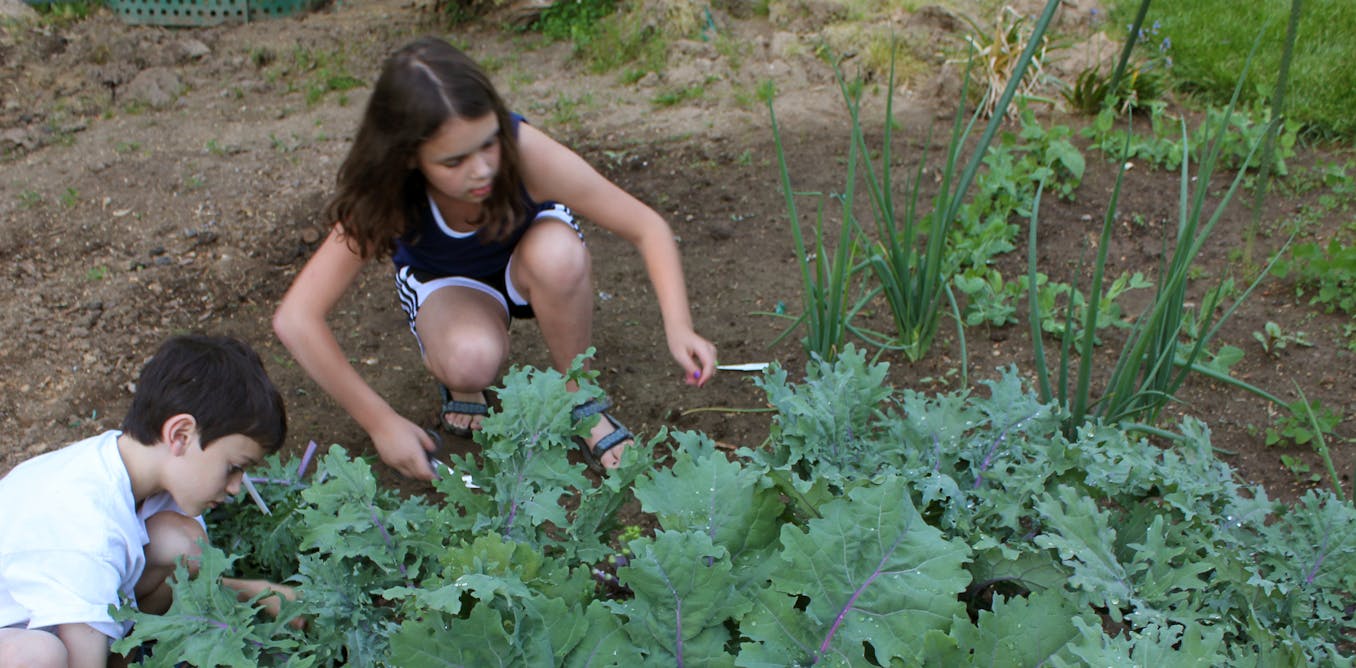[ad_1]
It’s back-to-school time in the US, and for numerous kids throughout the nation, it’s additionally time to get again into the varsity backyard.
For hundreds of years, educators and philosophers have argued that garden-based studying improves kids’s intelligence and boosts their private well being. Lately, issues associated to childhood weight problems and younger individuals’s disconnection from nature have led to a revitalized curiosity within the matter.
Tens of 1000’s of American colleges have some type of college backyard. Many are situated on college grounds and others are run by exterior neighborhood companions. Most are related to the college’s curriculum. As an illustration, seeds are utilized in science class to clarify plant biology, fruits are utilized in social research to show world geography and the harvest is utilized in math to discover weights and measures. Some even incorporate meals from the backyard into the varsity lunch.
As a researcher and an activist, I’ve spent the higher a part of the final decade working to advertise a wholesome, equitable and sustainable meals system. Via this course of, I’ve heard daring claims made in regards to the energy of garden-based studying to fulfill these challenges.
Given the keenness that surrounds garden-based studying in the present day, it’s price taking inventory of their general impacts: Do college gardens really enhance the schooling and well being of younger individuals?
Selling college gardens
Faculty gardens have develop into a favourite technique of distinguished advocates within the “Good Meals Motion.” Each celeb chef Jamie Oliver and First Girl Michelle Obama have been vocal supporters.

U.S. Division of Agriculture
Nonprofit and grassroots teams, who see these gardens as a means to supply recent produce for the meals insecure, have cast partnerships with native colleges. Then there are service-based teams, similar to FoodCorps, whose members spend one 12 months in a low-income neighborhood to assist set up gardens and develop different college meals initiatives.
Philanthropic organizations just like the American Coronary heart Affiliation have additionally sponsored the development of a whole bunch of recent college backyard plots.
Taken collectively, upwards of 25 p.c of public elementary colleges in the US embody some type of garden-based studying. Faculty backyard tasks are situated in each area of the nation and serve college students of all ages, ethnic backgrounds and socioeconomic lessons.
Reworking children lives by gardens?
Advocates argue that gardening helps children make more healthy consuming decisions. Because the self-proclaimed “Gangsta Gardener” Ron Finley put it in his widespread TED Speak,
“If children develop kale, children eat kale.”

UGA Faculty of Ag & Environmental Sciences – OCCS, CC BY-NC
Many proponents go even additional, suggesting that garden-based studying can encourage a wide range of wholesome adjustments for the entire household, serving to to reverse the so-called weight problems epidemic.
Others, like Edible Schoolyard founder Alice Waters, argue that have within the backyard can have a transformative affect on a baby’s worldview, making sustainability “the lens by which they see the world.”
Certain, gardens can assist
There may be loads of anecdotal proof to recommend that garden-based studying does yield instructional, dietary, ecological and social advantages.
For instance, a number of printed research have proven that garden-based studying can improve college students’ science data and wholesome meals behaviors. Different analysis has proven that garden-based studying can assist college students higher determine several types of greens in addition to result in extra favorable opinions on consuming greens.
Usually, qualitative case research of garden-based studying have been encouraging, offering narratives of life-changing experiences for youngsters and academics alike.

RubyDW, CC BY
Nonetheless, in relation to really rising the quantity of recent meals eaten by younger individuals, bettering their well being outcomes or shaping their general environmental attitudes, quantitative outcomes have tended to indicate modest positive factors at greatest. A few of the most extremely developed college backyard packages have been capable of improve pupil vegetable consumption by a couple of serving per day. However the analysis has not been capable of present whether or not these positive factors are maintained over time.
A scarcity of definitive proof has led some critics to argue that faculty gardens are merely not definitely worth the time and funding, particularly for lower-income college students who might be concentrating on extra conventional school prep research.
The social critic Caitlin Flanagan has gone as far as to say that backyard packages are a distraction that might create a “everlasting, uneducated underclass.”
There are not any magic carrots
There isn’t a doubt that the ability of garden-based studying is typically overstated.
Notably when describing backyard tasks in low-income neighborhoods and communities of coloration, widespread narratives suggest {that a} youngster’s time within the backyard will rescue her from a lifetime of poverty and continual illness.
I name this the “magic carrot” strategy to garden-based studying. However as everyone knows, there are not any magic carrots rising within the college backyard.
Gardens alone is not going to remove well being disparities, shut the tutorial achievement hole, repair unemployment or remedy environmental injustice.
When is a backyard profitable?
For gardens to successfully promote studying and well being, they have to be supported and bolstered by the neighborhood as a complete. Surveys of faculty backyard practitioners present that backyard packages have critical potential to boost college and neighborhood life – however provided that sure situations are met.
Notably, college gardens are most profitable when they aren’t held afloat by a single devoted trainer. As a substitute, a number of concerned stakeholders can be certain that a backyard doesn’t dry up after solely a season or two.

U.S. Division of Agriculture, CC BY
For instance, participation from directors, households and neighborhood companions can flip a college backyard right into a dynamic and sustainable neighborhood hub.
Many skilled practitioners have additionally proven that garden-based studying is extra highly effective when its curriculum displays the cultural backgrounds of the younger individuals it serves. When kids of Mexican descent develop indigenous types of corn, or when African-American youth domesticate collard greens, the method of rising meals can develop into a strategy of self-discovery and cultural celebration.
In different phrases, if children develop kale, they could eat kale, however provided that kale is obtainable of their neighborhood, if their household can afford to purchase kale and in the event that they assume consuming kale is related to their tradition and way of life.
Creating priceless inexperienced house
As my very own analysis has highlighted, there are organizations and colleges throughout the nation that incorporate garden-based studying into broader actions for social, environmental and meals justice.
These teams acknowledge that faculty gardens alone is not going to magically repair the issues our nation faces. However as a part of a long-term motion to enhance neighborhood well being, college gardens can present a platform for experiential schooling, create priceless inexperienced house and foster a way of empowerment within the minds and our bodies of younger People.
[ad_2]
